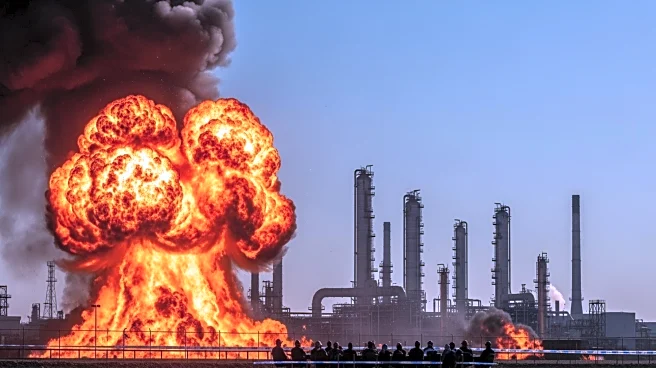What's Happening?
Ukrainian military forces have conducted overnight strikes on Russian oil and gas facilities located in the Samara and Orenburg regions, approximately 1,000 to 1,500 kilometers from Ukraine's frontline.
The targeted facilities, including the Novokuibyshevsk oil refinery in Samara Oblast, are integral to Russia's military supply chain. The refinery, which produces over 20 types of commercial products and has an annual processing capacity of 4.9 million tons, suffered explosions and fires, damaging its primary oil processing units. This attack is part of a series of Ukrainian drone strikes aimed at disrupting Russian military logistics.
Why It's Important?
The strikes on Russian oil facilities represent a strategic move by Ukraine to weaken Russia's military capabilities by targeting its logistical and supply infrastructure. By damaging key refineries, Ukraine aims to disrupt the flow of resources that support Russian military operations. This action could potentially strain Russia's military supply lines, impacting its operational effectiveness. The attacks also highlight the ongoing escalation in the conflict, with Ukraine leveraging drone technology to extend its reach deep into Russian territory. The broader implications could include increased tensions between Russia and Ukraine, as well as potential shifts in international diplomatic and military support for Ukraine.
What's Next?
The continuation of such strikes could lead to further retaliatory actions by Russia, potentially escalating the conflict. International stakeholders, including NATO and the United States, may need to reassess their support strategies for Ukraine in light of these developments. Additionally, there could be increased diplomatic efforts to mediate the conflict and prevent further escalation. The situation may also prompt discussions on the security of critical infrastructure in conflict zones and the role of drone technology in modern warfare.
Beyond the Headlines
The use of drones in these attacks underscores a significant shift in military tactics, highlighting the increasing importance of unmanned aerial vehicles in modern warfare. This development raises ethical and legal questions about the use of such technology in conflict, particularly regarding civilian safety and the potential for collateral damage. The attacks also reflect the broader geopolitical struggle between Russia and Ukraine, with potential long-term impacts on regional stability and international relations.










